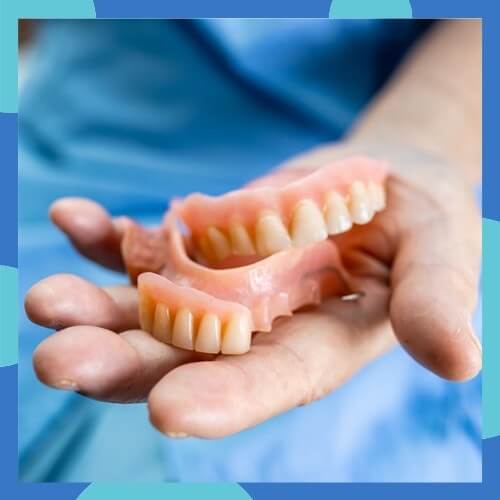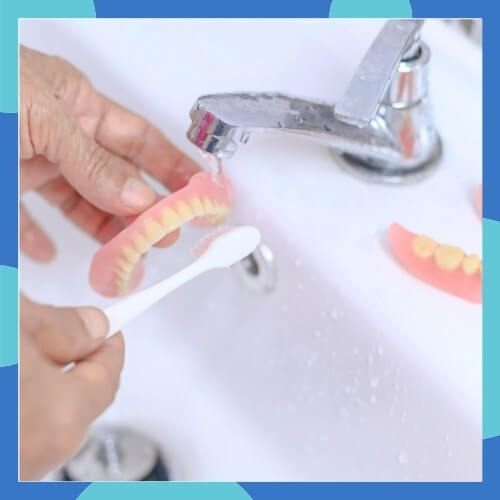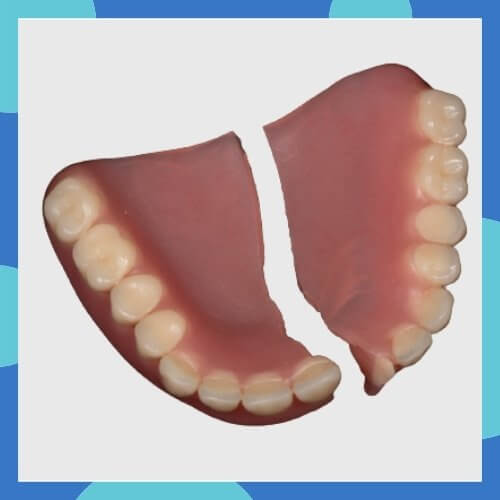While dentures are a wonderful blessing for those who have lost their teeth due to disease or intentional extraction, no one wants the experience of having loose dentures. Unfortunately, this problem is quite common and one we run into often at our practice.
Not only are loose dentures particularly uncomfortable, but the issue can also be embarrassing and unsettling as well. Loose dentures make it difficult to eat, talk, and smile and laugh with ease. Furthermore, there are certain oral health risks associated with chronically loose dentures.
The good news, when it comes to fixing loose or broken dentures, is that they can nearly always be repaired and returned to a comfortable fit. On the other hand, it’s important to remember that if you are a dentures-wearer, you will almost surely run into this issue at some point in your life — it’s simply a natural consequence of wearing dentures long-term.
Table of Contents
How Do Dentures Become Loose in the First Place?
There are an array of reasons why dentures may become loose over time. In most cases, bone resorption is the culprit.
Bone resorption occurs when the gums actually start to shrink back over time. This is the result of tissue changes and the gums no longer being required to hold in the teeth. Often, bone resorption happens quickly after the tooth extraction process. When teeth are pulled, the gum tissue usually becomes inflamed. This is completely normal, but it can cause a “false fit” when your dentures are initially placed.
Right away, the inflamed tissue will accommodate the dentures in one way, and then over time, the oral tissue will begin to shrink back, and your dentures will start to feel loose.
Again, this is nothing to be concerned about, but it may require you to see your dentist again for a denture adjustment. Most dentists will prepare you for this occurrence and will have an adjustment appointment already arranged for you after your tooth extraction.
Of course, there are other reasons for loose dentures to become a problem as well. As with many dental issues, general use of your teeth for biting and chewing over time can lead to overall wear and tear on your dentures, making them loose.
One good way to prevent this type of issue is to take quality care of your dentures at all times. This means not biting down too hard when you eat and taking care when chewing. You should also always take your dentures out of your mouth before you go to bed at night and care for them properly.
Finally, drastic changes in your weight may lead to changes in how your dentures fit. This is a surprise for many patients, but it’s true: If you suddenly gain or lose a significant amount of weight, it’s not just your waistline and the number on the scale that will be affected. You may notice changes in your denture fit too.
How Can Loose, Ill-Fitting Dentures Be Fixed?
The first thing to keep in mind here is that you should always make an appointment with your dentist right away as soon as you notice any loosening in your dentures. The earlier you can address this problem, the better — both for your comfort and your overall health.
There are several ways to fix loose dentures:
1. Denture adhesives
Often, we see patients who quickly Googled “how to fix loose dentures” as soon as they experienced this problem at home. The answer they find online often leads them to purchase denture adhesives at the local drugstore. Unfortunately, these patients think that they have completely solved their problem once they’ve purchased denture adhesives and put them to work.
In fact, this isn’t the case, and using denture adhesives for longer than a few days or weeks isn’t advised by dental professionals.
What are denture adhesives?
Denture adhesives come in the form of powders, pads, or pastes. These products are placed directly on your dentures to help them stay firmly in place in your mouth. They definitely work, but what’s important to remember is that they are only temporary and not a permanent solution.
While we do not advise the use of denture adhesives over the long-term, if you are unable to get in to see your dentist right away, they are certainly an acceptable solution for holding your dentures in place and preventing too much movement until you can see your dentist.
One other important note: do not purchase dental adhesives that contain zinc as these can cause serious health problems, in particular if you consistently consume a diet rich in zinc.
2. The relining of your dentures
Dental relining is a common procedure, and most denture-wearers will require relining at at least some point in their lives. We generally recommend this procedure for patients whose dentures have become loose after wearing them for more than two years. Though, many patients require relining for that as well.
Also called dental resurfacing, denture relining ensures proper fit of your dentures in your mouth. In general, there are two main types of denture relining procedures. Your dentist will evaluate your gums and several other medical factors and make a recommendation as to which method is best for you:
- Hard denture relines. This process uses a hard acrylic material to obtain a better fit.
- Soft denture relines. This process uses a much softer material for relining and optimal fit. It is recommended for patients who tend to have tender gums.
3. Dental implant retained dentures: an optimal solution
Again, dental relining is generally a required procedure for most denture wearers at at least one point in their lives. Still, it is only another type of temporary solution that will likely need to be adjusted again after several years.
A more permanent solution and one that always achieves better results is the use of dental implants. For nearly all patients who struggle with loose dentures, dental implants are the ultimate solution. This procedure completely retains dentures in a secure, implanted position, eliminating the possibility of your dentures becoming loose. You will no longer require adhesives, and you won’t suffer from movement-induced loose denture discomfort or the resulting embarrassment.
Professionals also recommend dental implant retained dentures to preserve the remaining jaw bone that you have. Dental implant retained dentures are ultra-stable and secure, look absolutely natural, and improve stability and comfort overall.
Frequently Asked Questions About Loose Dentures
Q: How often do dentures need to be adjusted
A: Denture wearers should have their dentures evaluated by a dental professional at least once a year — ideally, at one of your yearly cleaning appointments. Denture adjustments may need to happen less often, but they are usually mandatory for all denture wearers at some point.
For most patients, one or more adjustments will be necessary right after your initial denture fitting. This is to establish the proper fit right off the bat. Thereafter, you can expect to have your dentures relined once every few years as your oral tissue changes.
Q: How will I know if my dentures have the proper fit?
A: If you’ve been wearing your dentures for a while, they should feel comfortable and normal. Any changes in feeling should be addressed by your dentist.
If you’re new to wearing dentures, on the other hand, you may have a harder time comprehending the proper fit. A certain level of early soreness is normal, and you might have a bit of initial difficulty learning how to chew and speak too. Over time, though, you should hardly notice they’re there. Your top dentures will adhere with a close suction seal to your top gums, and your lower dentures should fit comfortably above your lower gums.
Q: Can I not wear loose fitting dentures?
A: If you’ve just noticed that your dentures are becoming loose, schedule an appointment with your dentist as soon as possible. In the meantime, if you can’t get in to see your dental professional right away, use a temporary adhesive purchased at the drugstore to secure your dentures. Remember not to use temporary adhesives for a long period of time as they are not meant as a permanent solution to loose dentures.
Q: What problems can loose dentures cause?
A: Wearing loose dentures for a significant period of time can cause serious medical issues in addition to overall discomfort and generalized pain in and around your mouth.
First, loose dentures will cause gum irritation and abrasion, which can lead to inflammation and possibly even infection. Over time, some patients even develop blisters on their gums.
When you have difficulty eating with your loose dentures, your biting will also become uneven, as will your chewing. This can lead to pain in your jaw, headaches, and other issues. In some cases, patients even develop neck and ear aches due to the delayed secondary effects of long-term loose denture wearing.
Don’t Let Loose Dentures Keep You From Enjoying Life
Loose dentures are a terrible problem for many people. They can make it difficult to speak, smile, and laugh comfortably and even harder to bite and chew food without pain or embarrassment. Unfortunately, far too many patients think they can continue putting a Band-Aid over the issue of loose dentures with temporary denture adhesives at home. This is no way to care for your oral health and look after your own comfort. There are better solutions available, and your dentist can help.
If you have loose dentures, don’t wait to get them looked at by an experienced dental professional. Schedule an appointment at our practice today to have your dentures examined and get the required relining or implant procedure performed. We want you to go home with a happy, healthy, comfortable smile!
Please schedule your next appointment today here so that we can assist you in repairing your broken or loose dentures. We look forward to hearing from you soon!




